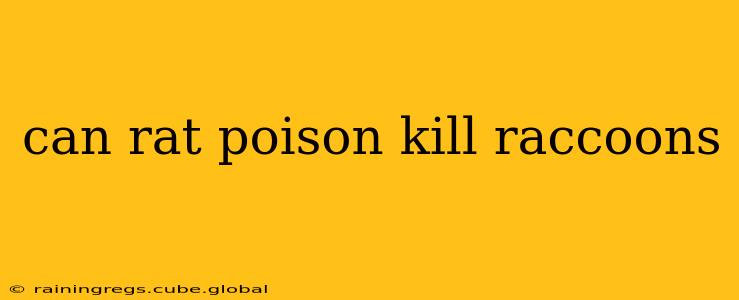Can Rat Poison Kill Raccoons? The Dangers of Using Rodenticides on Wildlife
The short answer is: yes, rat poison can kill raccoons, but using it to do so is dangerous, unethical, and often illegal. While rodenticides are designed to kill rodents, raccoons are opportunistic omnivores and might accidentally ingest the poison, leading to a slow and painful death. This article will delve into the specifics of why you should never use rat poison to control a raccoon population.
What Happens if a Raccoon Eats Rat Poison?
Raccoons, like other mammals, can suffer severe internal bleeding and organ damage from ingesting rodenticides, particularly anticoagulant rodenticides. These poisons prevent blood clotting, leading to internal hemorrhaging. The raccoon may exhibit symptoms like weakness, lethargy, nosebleeds, and difficulty breathing before ultimately succumbing to the effects of the poison. The death is often slow and agonizing.
Is it Legal to Use Rat Poison to Kill Raccoons?
Using rat poison to intentionally kill raccoons is illegal in many jurisdictions. Raccoons are often considered wildlife, and harming or killing them without proper permits is a violation of wildlife protection laws. The specific regulations vary by location, so it's crucial to check your local and state laws before taking any action. Penalties for illegal wildlife killing can include hefty fines and even jail time.
What are the Safer Alternatives to Rat Poison for Raccoon Control?
Instead of resorting to potentially harmful and illegal methods, consider these humane and safe alternatives for dealing with raccoons:
- Exclusion: The most effective way to prevent raccoons from accessing your property is to seal all potential entry points. This includes repairing holes in roofs, walls, and fences, and ensuring garbage cans are securely sealed.
- Deterrents: Various deterrents, such as motion-activated sprinklers, bright lights, and noisemakers, can discourage raccoons from lingering in your yard. However, these are most effective for preventing raccoons from accessing specific areas, not for eliminating them from your neighborhood.
- Trapping and Relocation: If you have a persistent raccoon problem, consider trapping the animal humanely and relocating it to a suitable habitat away from human dwellings. This requires obtaining the necessary permits and following local regulations. It’s also crucial to ensure the relocation site is appropriate and safe for the animal. This is best handled by a wildlife removal professional.
- Calling Wildlife Control: The best approach is to contact a licensed and experienced wildlife removal professional. They have the expertise and equipment to safely and humanely handle raccoon problems while adhering to all relevant laws and regulations.
Why is Rat Poison Harmful to the Environment?
The use of rodenticides poses a significant threat to the environment beyond just harming raccoons. Non-target species, such as pets, birds of prey, and other wildlife, can inadvertently consume the poison through secondary poisoning (eating a poisoned rodent), leading to widespread ecological damage. The persistent nature of some rodenticides means their effects can linger in the environment for years.
What Should I Do if I Suspect a Raccoon has Ingested Rat Poison?
If you believe a raccoon has ingested rat poison, contact your local animal control or wildlife rehabilitation center immediately. They can assess the situation and provide appropriate care or guidance. Do not attempt to handle the raccoon yourself, as they can be aggressive and potentially carry diseases.
In conclusion, while rat poison might kill raccoons, it's a dangerous, unethical, and often illegal approach. Prioritizing humane and environmentally responsible methods is crucial for both wildlife conservation and human safety. Always consult with professionals for assistance with wildlife issues.
